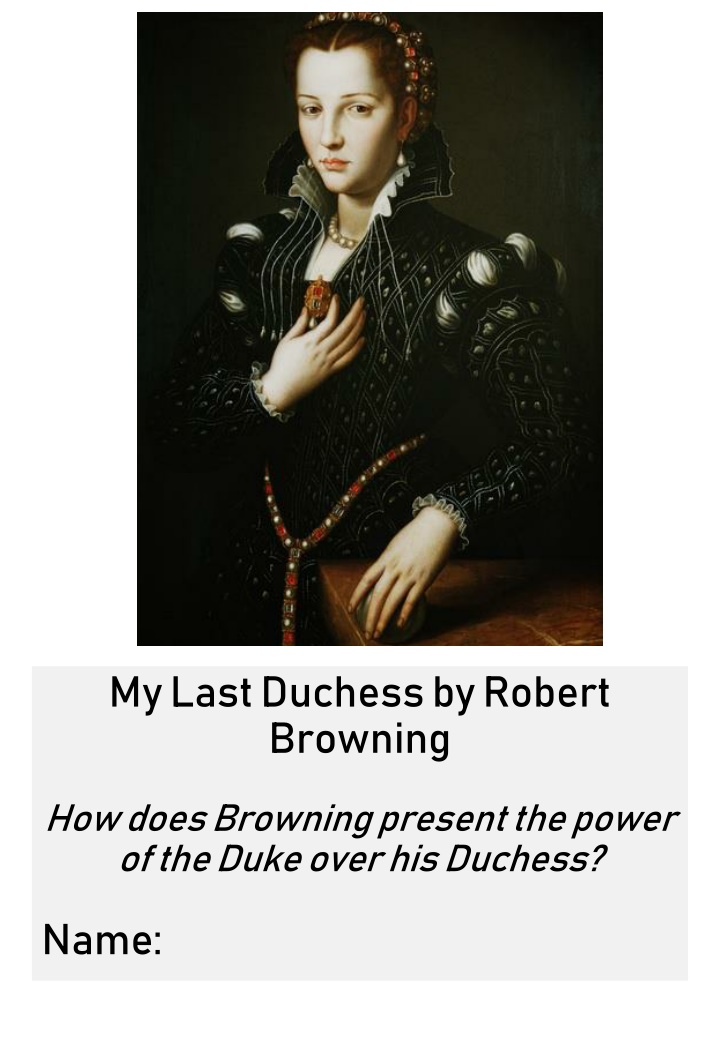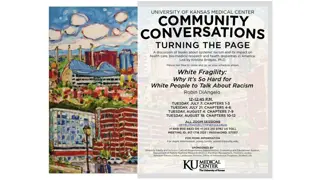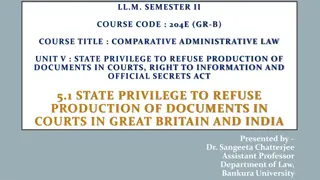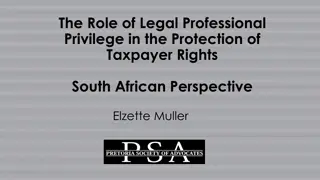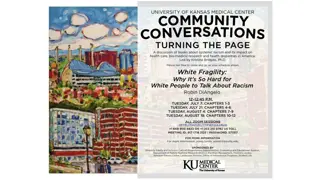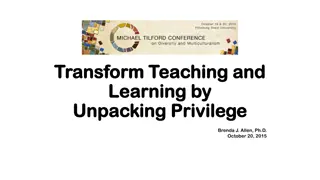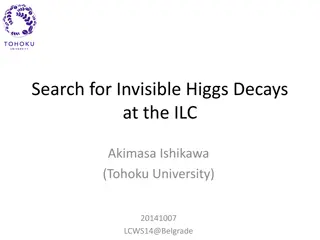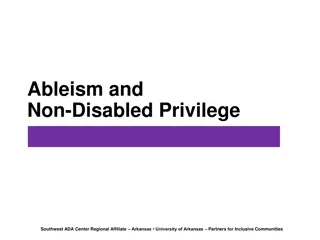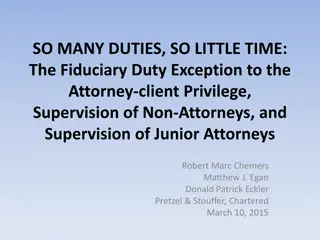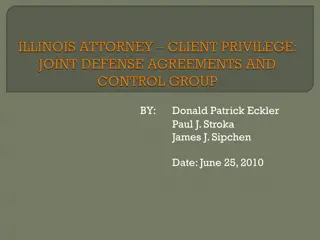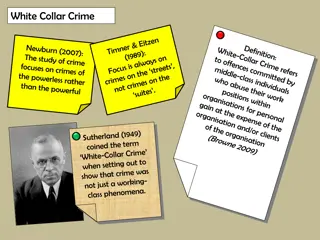Unpacking White Privilege: Male Advantage, Invisible Systems
This content explores white and male privilege, highlighting how men benefit from systems that disadvantage women and shedding light on the invisible advantages that whites possess. It discusses societal disparities and the need to use one's privilege to dismantle oppressive structures.
Download Presentation

Please find below an Image/Link to download the presentation.
The content on the website is provided AS IS for your information and personal use only. It may not be sold, licensed, or shared on other websites without obtaining consent from the author.If you encounter any issues during the download, it is possible that the publisher has removed the file from their server.
You are allowed to download the files provided on this website for personal or commercial use, subject to the condition that they are used lawfully. All files are the property of their respective owners.
The content on the website is provided AS IS for your information and personal use only. It may not be sold, licensed, or shared on other websites without obtaining consent from the author.
E N D
Presentation Transcript
My Last Duchess by Robert Browning How does Browning present the power of the Duke over his Duchess? Name:
Read through the following text. As you are reading, make notes on your response to the text. You may wish to consider What you think is happening in the poem What you think the message of the poem is Any words, phrases or images that particularly strike you The way in which the poem is organised How you feel reading the poem My Last Duchess by Robert Browning Summary / personal reflection in response to key question Ferrara 1 2 3 4 5 6 7 8 9 10 11 12 13 14 15 16 17 18 19 20 21 22 23 24 25 26 27 28 29 30 31 32 33 34 35 36 37 38 39 40 That s my last Duchess painted on the wall, Looking as if she were alive. I call That piece a wonder, now: Fra Pandolf s hands Worked busily a day, and there she stands. Will t please you sit and look at her? I said Fra Pandolf by design, for never read Strangers like you that pictured countenance, The depth and passion of its earnest glance, But to myself they turned (since none puts by The curtain I have drawn for you, but I) And seemed as they would ask me, if they durst, How such a glance came there; so, not the first Are you to turn and ask thus. Sir, twas not Her husband s presence only, called that spot Of joy into the Duchess cheek: perhaps Fra Pandolf chanced to say, Her mantle laps Over my lady s wrist too much, or Paint Must never hope to reproduce the faint Half-flush that dies along her throat : such stuff Was courtesy, she thought, and cause enough For calling up that spot of joy. She had A heart how shall I say? too soon made glad, Too easily impressed; she liked whate er She looked on, and her looks went everywhere. Sir, twas all one! My favour at her breast, The dropping of the daylight in the West, The bough of cherries some officious fool Broke in the orchard for her, the white mule She rode with round the terrace all and each Would draw from her alike the approving speech, Or blush, at least. She thanked men, - good! But thanked Somehow I know not how as if she ranked My gift of a nine-hundred-years-old name With anybody s gift. Who d stoop to blame This sort of trifling? Even had you skill In speech (which I have not) to make your will Quite clear to such an one, and say, Just this Or that in you disgusts me; here you miss, Or there exceed the mark and if she let
Summary / personal reflection in response to key question 41 42 43 44 45 46 47 48 49 50 51 52 53 54 55 56 57 Herself be lessoned so, nor plainly set Her wits to yours, forsooth, and made excuse, - E en then would be some stooping; and I choose Never to stoop. Oh sir, she smiled, no doubt, Whene er I passed her; but who passed without Much the same smile? This grew; I gave commands; Then all smiles stopped together. There she stands As if alive. Will t please you rise? We ll meet The company below, then. I repeat, The Count your master s known munificence Is ample warrant that no just pretence Of mine for dowry will be disallowed; Though his fair daughter s self, as I avowed At starting, is my object. Nay, we ll go Together down, sir. Notice Neptune, though, Taming a sea-horse, thought a rarity, Which Clause of Innsbruck cast in bronze for me! Now watch the video lecture by Miss Odell entitled How does Browning present the power of the Duke over the Duchess? As you are watching, annotate the poem to record the contextual backdrop to the poem, the key ideas, key words, phrases and images and key structural points. My Last Duchess by Robert Browning 1 Ferrara 2 3 4 5 6 7 8 9 10 11 12 13 14 15 16 17 18 19 20 21 22 23 24 That s my last Duchess painted on the wall, Looking as if she were alive. I call That piece a wonder, now: Fra Pandolf s hands Worked busily a day, and there she stands. Will t please you sit and look at her? I said Fra Pandolf by design, for never read Strangers like you that pictured countenance, The depth and passion of its earnest glance, But to myself they turned (since none puts by The curtain I have drawn for you, but I) And seemed as they would ask me, if they durst, How such a glance came there; so, not the first Are you to turn and ask thus. Sir, twas not Her husband s presence only, called that spot Of joy into the Duchess cheek: perhaps Fra Pandolf chanced to say, Her mantle laps Over my lady s wrist too much, or Paint Must never hope to reproduce the faint Half-flush that dies along her throat : such stuff Was courtesy, she thought, and cause enough For calling up that spot of joy. She had A heart how shall I say? too soon made glad, Too easily impressed; she liked whate er
25 26 27 28 29 30 31 32 33 34 35 36 37 38 39 40 41 42 43 44 45 46 47 48 49 50 51 52 53 54 55 56 57 She looked on, and her looks went everywhere. Sir, twas all one! My favour at her breast, The dropping of the daylight in the West, The bough of cherries some officious fool Broke in the orchard for her, the white mule She rode with round the terrace all and each Would draw from her alike the approving speech, Or blush, at least. She thanked men, - good! But thanked Somehow I know not how as if she ranked My gift of a nine-hundred-years-old name With anybody s gift. Who d stoop to blame This sort of trifling? Even had you skill In speech (which I have not) to make your will Quite clear to such an one, and say, Just this Or that in you disgusts me; here you miss, Or there exceed the mark and if she let Herself be lessoned so, nor plainly set Her wits to yours, forsooth, and made excuse, - E en then would be some stooping; and I choose Never to stoop. Oh sir, she smiled, no doubt, Whene er I passed her; but who passed without Much the same smile? This grew; I gave commands; Then all smiles stopped together. There she stands As if alive. Will t please you rise? We ll meet The company below, then. I repeat, The Count your master s known munificence Is ample warrant that no just pretence Of mine for dowry will be disallowed; Though his fair daughter s self, as I avowed At starting, is my object. Nay, we ll go Together down, sir. Notice Neptune, though, Taming a sea-horse, thought a rarity, Which Clause of Innsbruck cast in bronze for me!
